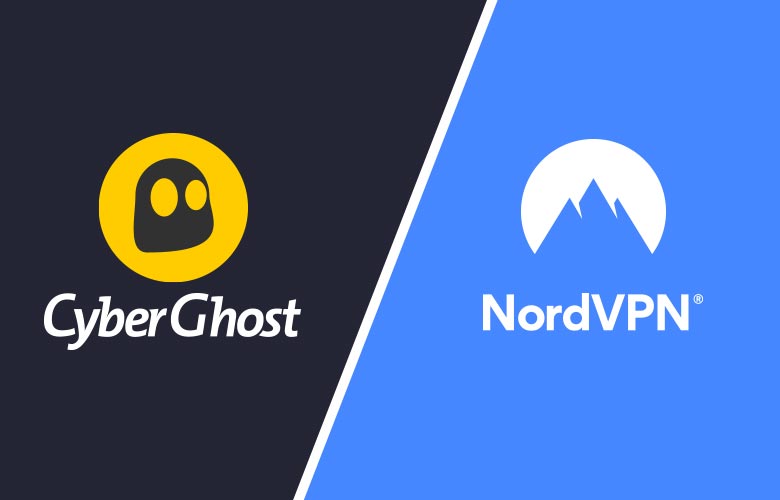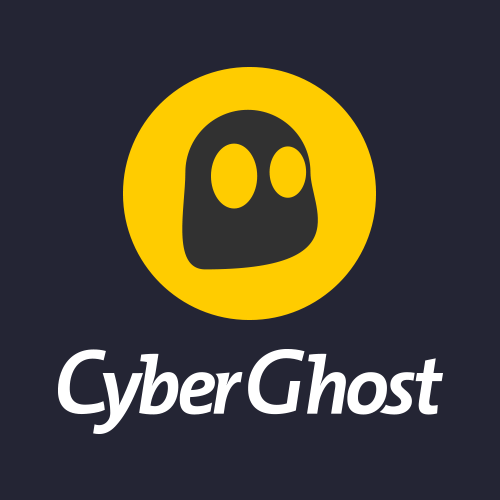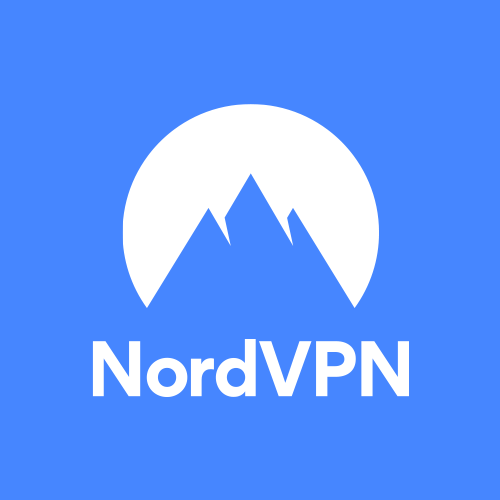Disclaimer: Partnerships & affiliate links help us create better content. Learn how.
When it comes to picking a secure VPN, what do you look for? Maybe it’s excellent streaming capability. Or, perhaps it’s an iron-clad privacy policy. No matter what seals the deal for you, you can rest assured that there’s a solution for you among the thousands of VPN options available today.
In this CyberGhost vs NordVPN comparison guide, we walk you through the main differences between these two premium providers to help you make an informed decision on which VPN to invest in. Both providers are fantastic at keeping users safe online. However, we found NordVPN to be superior overall.

CyberGhost
- Allows torrenting/P2P
- Dedicated streaming servers
- OpenVPN protocol and AES-256 encryption
- Apps for Android, iOS, macOS & Windows
- Doesn’t work with Chromebook
- Logs some anonymous data

NordVPN
- Slick UI for easy use
- Vast array of security features
- Massive list of high-speed U.S. servers
- P2P optimized servers & unblocks Netflix
- Manual setup required to work in China
- No free version
| Pricing | |||||||||||||||
|---|---|---|---|---|---|---|---|---|---|---|---|---|---|---|---|
|
CyberGhost vs. NordVPN: Performance
Before investing in a VPN, it’s important to note that all VPN services reduce internet speeds to some degree. Luckily, premium VPNs like CyberGhost and NordVPN do a much better job of mitigating their effect on speeds compared to free competitors. To see where CyberGhost and NordVPN land on their performance, our experts put their servers to the test.
Through our testing, NordVPN showed impressive numbers, averaging download speeds of 98 Mbps (and a speed loss of only 2-10% overall). In contrast, CyberGhost came in significantly under with average download speeds of 44 Mbps. All tests were conducted with a base internet plan of 100 Mbps, and even with CyberGhost performing half as well as NordVPN, neither is bad when you consider minimum speeds required for users.
According to the FCC’s definition of broadband, users need a minimum download speed of 25 Mbps and 3 Mbps upload speed for most online activities. Based on this knowledge and our tests across multiple VPN servers, either would be sufficient for regular online tasks.
CyberGhost vs. NordVPN: Privacy
When it comes to online privacy, we hold all VPNs to a very high standard as online safety is the number one benefit of having a VPN at all. To determine which provider offers the best privacy protection, we look at more than just their privacy policy. We also take into account where each provider is based and whether or not they have any independent audits to back their claims. Here’s what we found:
Provider Headquarters
A provider’s headquarters says a lot about the validity of their privacy claims. Depending on which country a provider is based, a VPN could be forced, by law, to release customer information in the event of an investigation. To users’ benefit, NordVPN is headquartered in Panama, a well-known safe haven from government overreach and censorship. On the flip side, CyberGhost is based in Bucharest, Romania. This raises a few concerns in that Romania has close ties to the UK, Germany, and Israel (all members of surveillance alliances). However, CyberGhost employs ‘NoSpy’ servers housed in a crowdfunded data center to offer extended online protection from government surveillance and third-party interference.
Third-party Audits
If you really want to get an unbiased opinion of a VPN’s privacy policy, take a look at their auditing history. Third-party audits are a great way to know if their claims hold any weight. Essentially, an independent company will research, test, and analyze the privacy features and policy of a VPN provider and then give a report of their findings. Of the two, NordVPN is the only one to undergo an independent screening of their privacy claims in recent years by both PricewaterhouseCoopers (PwC) and Cure53. However, we did notice that CyberGhost releases a Transparency Report every three months that provides information about malware flags, the CyberGhost team, and infrastructure updates, which we did appreciate. Still, we believe these don’t hold as much weight as an external audit does overall.
For more information about their privacy claims, we encourage users to visit the NordVPN and CyberGhost policies online.
CyberGhost vs. NordVPN: Logging
More than performance and streaming, you can tell a lot about a VPN by its logging policy. What’s even more, many providers claim to have a strict zero-logs policy, yet unknowingly to customers, still store customer data on a server level. Both providers here swear by their no-logs policy, however, in this NordVPN vs CyberGhost guide, we looked into their server practices to see just how trustworthy they are.
Similar to Surfshark, NordVPN has a robust logging policy backed by good server practices. It runs all of its servers in RAM-disk mode, which makes it impossible for any user data to be stored permanently on its server. In addition, it confirms that what little information it does collect for account management and payments is itself encrypted using AES-256 encryption. Lastly, its Panama headquarters gives us further reassurance that, even in the event of customer data somehow being stored, the VPN provider is under hands-off jurisdiction.
On the other hand, we found that CyberGhost’s no-logs claims have one weakness in that CyberGhost does not run servers in RAM-disk mode, which means client data can in fact be stored on servers and is vulnerable in the event of a server being seized. This is a fringe case in most instances, however, we’re leaving no stone left unturned here.
Overall, NordVPN does the best in the logging category, if for nothing else, thanks to its recent auditing history.
CyberGhost vs. NordVPN: Streaming
If you live for Netflix, then you’ll want to read this section in full. We tested both CyberGhost and NordVPN on various servers to see just how easy it is for users to access geo-restricted content with their apps. To our surprise, we discovered CyberGhost’s biggest strength.
One area that CyberGhost shines more than NordVPN is streaming and torrenting. Known as one of the best VPNs for streaming, CyberGhost maintains dedicated streaming servers on one of the largest server networks in the world. It has over 6,200+ servers across 90 countries, adding new locations every week to meet the demands of its users. And, like ExpressVPN, CyberGhost bravely advertises an extensive list of the streaming websites it can unblock, the most important being Netflix, BBC iPlayer, and ESPN+.
While NordVPN still offers decent streaming capabilities, it isn’t on the same level as CyberGhost. NordVPN does have a sizable server network with 5,500+ servers spanning 59 countries. Yet, rather than providing a list of websites it can unblock, NordVPN vaguely makes the statement that it can “unblock international content.” Still, NordVPN was able to bypass popular sites like Netflix, YouTube, and BBC iPlayer, which is more than other competitors can say for themselves.
All in all, we rank CyberGhost as the best streaming VPN here.
CyberGhost vs. NordVPN: Which is better?
As you can see, the ultimate winner in this battle is NordVPN. Taking into account the important factors of a VPN service, the end results are clear:
- Server Network: CyberGhost
- Performance: NordVPN
- Price: NordVPN
- # of Devices: CyberGhost
- Privacy: NordVPN
- Logging: NordVPN
- Streaming: CyberGhost
While CyberGhost is arguably the best VPN for streaming and torrenting, we believe NordVPN has more to offer overall from a VPN service. Its faster connection speeds, verified privacy claims, and a vast array of security features put NordVPN over the top in our book.
If you’d like a further look into each provider separately, check out our NordVPN and CyberGhost reviews for more information. You can also explore top VPN deals available, too, to save the most money. Remember, at the end of the day, the right VPN for you comes down to personal preference.
Pick which one is best for you: CyberGhost vs. NordVPN

CyberGhost





